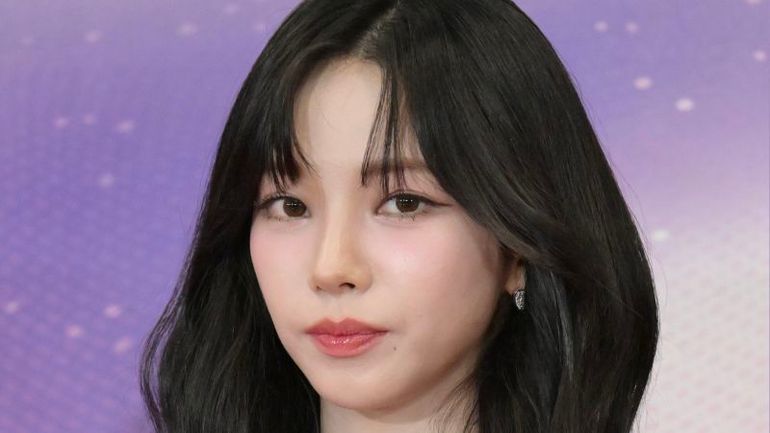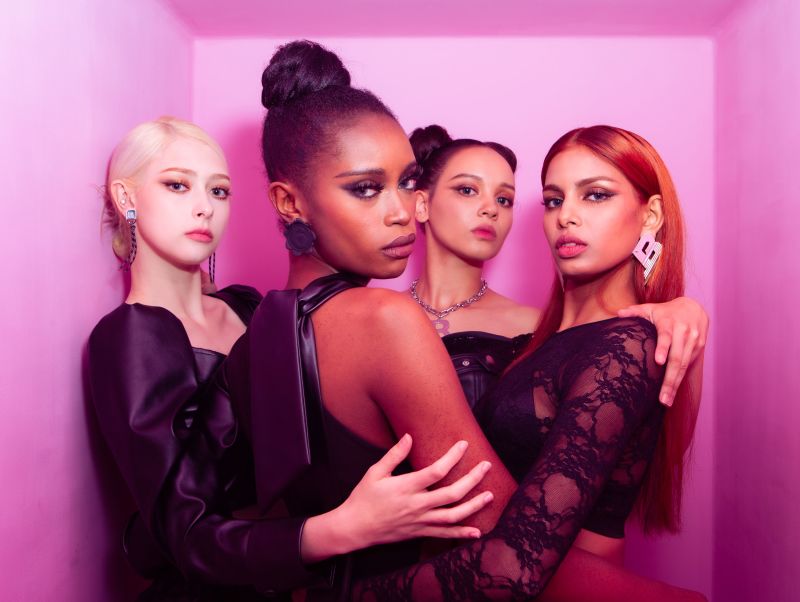
K-pop idol issues apology to fans following uproar over public relationship disclosure

After the revelation of K-pop idol Karina's romantic involvement with actor Lee Jae-wook, a wave of astonishment and outrage swept through a segment of dedicated fans. Find out how Karina addresses the backlash with a heartfelt apology.
In some circles, the question remains: Are K-pop stars permitted to be in love?
Recently, K-pop singer Karina of the group Aespa faced backlash from some of her dedicated fans after news of her relationship surfaced. This led to her posting a handwritten apology online in response.
Last week, news about her relationship with actor Lee Jae-wook was revealed by the agencies of both stars.
The reaction from fans in Asia was quick and varied. Some showed their support for the couple, while others were surprised and upset.
Some angry fans went as far as sending a truck with a digital billboard to the office of Karina's agency. The Chosun Ilbo newspaper even published a photo of the sign, which said: "Don't you feel loved by your fans? Why did you decide to betray them?"
The sign also warned, "Apologize directly or you'll notice a drop in album sales and empty seats at your concerts."
On Wednesday, Karina posted a handwritten apology letter on her Instagram account, where she has 12.7 million followers.
In the letter, she expressed her understanding of how disappointed and upset her fans must be feeling about the memories they shared together. Karina promised to make it up to her hurt fans and emphasized that she values each and every one of them dearly.
She apologized sincerely to her supporters and promised to show more maturity and work harder in the future to avoid letting down her fans. She expressed extreme loyalty to those who have stood by her throughout her career.
In many parts of the world, it's common for news about a young pop star and an actor dating to be just a simple celebrity gossip. However, in South Korea and Japan, this kind of announcement can still be seen as a taboo. This is because fans in these countries tend to idolize their favorite stars, and the entertainment industry likes to maintain the illusion that celebrities are single and available.
K-pop stars often live under strict rules, making it very rare for them to publicly date. Labels are concerned that relationships could cause stars to lose their appeal to fans. This concern is justified, as there have been cases of fans turning against performers who have shared their relationships publicly.
AI Kpop Watson PKG INTLDSK_00004211.png
AI Kpop Watson PKG INTLDSK_00004211.png
video
Related video
Could AI-powered virtual bands be the next big thing in K-pop?
Back in 2018, Cube Entertainment faced a setback when their artists Hyuna and E-Dawn revealed they were dating. This led to a drop in the company's stock and the suspension of both artists, who were part of the group Triple H.
The K-pop industry is known for its passionate fanbases, who play a big role in promoting their favorite groups. Fans often go the extra mile to support and publicize the artists they love.
One common way fans show their support is by making charitable donations in celebrities' names to enhance their public image. They also sometimes pay for independent advertisements to promote tours or new albums.
But this extreme loyalty also means artists and agencies are tightly tied to fan demands and desires – piling on pressure for K-pop stars under intense scrutiny.
Fans split
In recent years, there have been noticeable changes as agencies are moving away from using controversial contract terms.
Although it is still uncommon for agencies to publicly announce the romantic relationships of K-pop idols, there have been a few more instances lately. For example, last year, the agencies of Blackpink singer Jisoo and actor Ahn Bo-hyun confirmed that they were dating.
Fans are now encouraging each other to respect the privacy of celebrities and let them live their lives. In response to Karina's apology post on Wednesday, many fans flooded the comment section with messages of support.
One top comment expressed that "No idols (K-pop stars) should apologize for dating in 2024." Another user wrote, "Apologize for loving someone? You don't need to do this."
K-Pop group Blackswan.
K-Pop group Blackswan.
DR Music
Related article
Blackswan, a K-pop group with no Korean members, is proving that diversity is a key ingredient in the music industry. Their unique approach has been gaining attention and admiration from fans worldwide.
The news of Blackswan's success also spread to Chinese social media platforms. Aespa, another K-pop group with a Chinese member, has a significant following in China. While some fans showed support for Blackswan, others expressed dissatisfaction with a member's apology.
One user on China’s Twitter-like platform Weibo expressed skepticism about Karina's sincerity in her apology. They believed that if she truly valued her fans, she wouldn't have gotten into a romantic relationship in the first place. They felt that her apology was insincere and only a tactic to protect her image, revealing her fear of losing fans and financial support.
Other fans also noticed that Karina's apology did not address the status of her relationship. This led to speculation that her silence on the matter was a confirmation that she was still dating.
One Weibo user expressed, "What the fans truly want to hear from her is that she has ended the relationship and is no longer in contact with the guy."
Another user stated, "How can she seem so carefree and untroubled after everything that has happened? Acting happily in love while leaving fans feeling abandoned, as if nothing has occurred. She can't have it both ways."
CNN’s Wayne Chang contributed reporting.
Editor's P/S:
The article highlights the complex relationship between K-pop idols and their fans, particularly regarding the idols' romantic lives. While it's becoming more common for agencies to acknowledge relationships, the industry still faces pressure from fans who often idolize their stars and expect them to be single and available. This can lead to backlash and intense scrutiny, as seen in the case of Karina's relationship revelation.
The article also explores the evolving nature of fan culture in K-pop, with some fans now advocating for the privacy of celebrities and encouraging respect for their personal lives. However, it also acknowledges that fans play a vital role in promoting and supporting their favorite groups, which can lead to a sense of ownership and expectations. The article raises questions about the fine line between fan dedication and the pressure it can place on idols, and the need for a balance between the public's desire for transparency and the artists' right to privacy.









